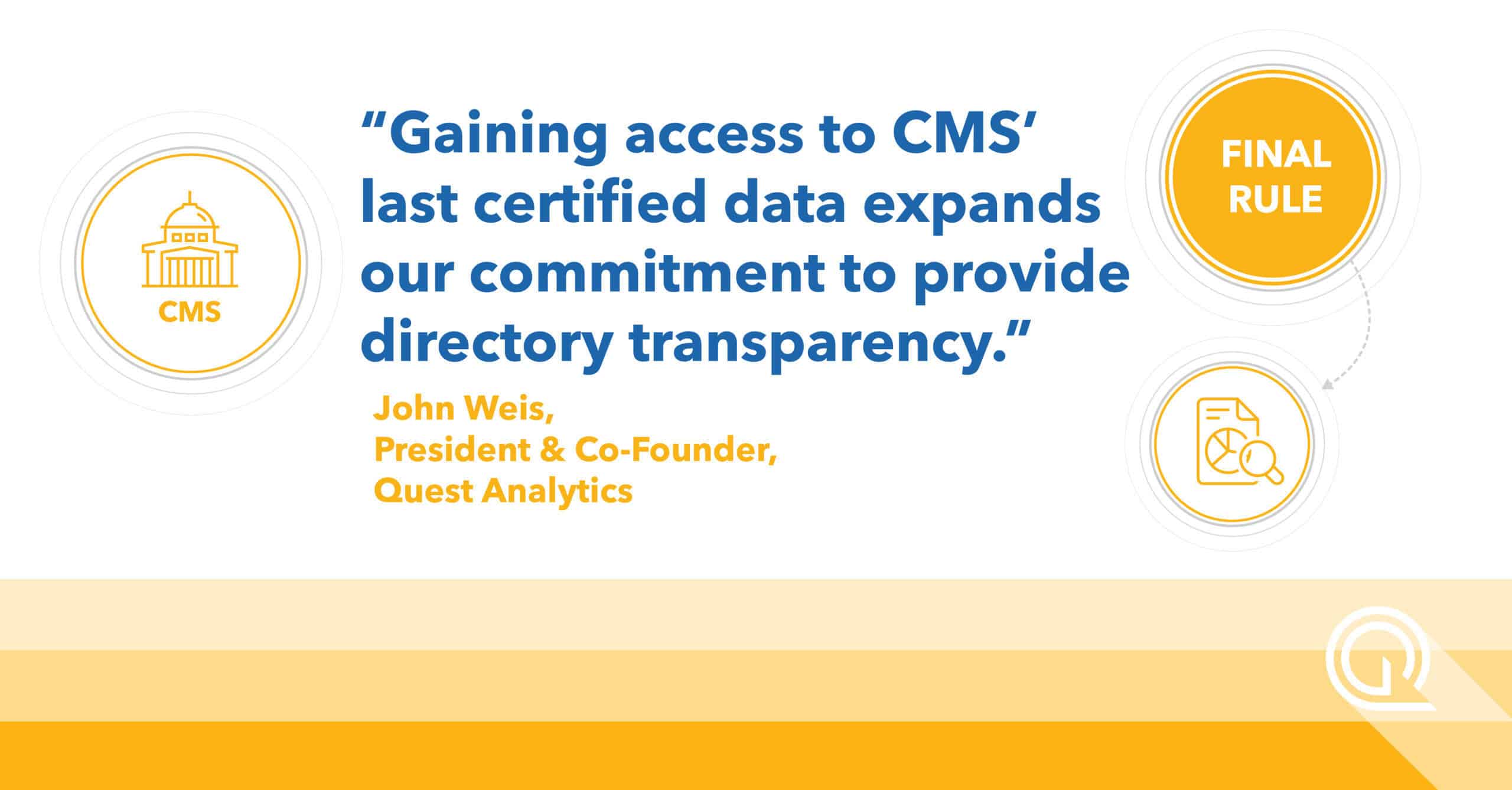Reprinted with AIS Health permission from the January 16, 2020, issue of RADAR on Medicare Advantage.
Though a small assist in the gargantuan task that is improving Medicare Advantage provider directory accuracy, CMS’ new plan to use the National Plan and Provider Enumeration System (NPPES) as a reference source may help insurers gain better insight into the accuracy of their own data. But insurers should be wary of the database’s shortcomings, and they will have to work with their provider partners to ensure that they are making timely updates to the NPPES, industry experts advise.
As of January 1, 2020, the NPPES will enable providers to substantiate the accuracy of their National Provider Identifier (NPI) data, according to a January 3, 2020, memo from the Medicare Drug & Health Plan Contract Administration Group within the CMS Center for Medicare. The NPPES contains certain core directory elements (e.g., name, address, specialty, telephone number) in “a machine-readable format for virtually every provider in the country,” explained CMS. The agency has for years maintained that accurate directory data is critical for beneficiary access, while repeated reviews of online directories have found that they are rife with errors.
“From our viewpoint, I don’t think this was really surprised at all,” remarks John Weis, Co-Founder of Quest Analytics, LLC, which assists Medicare Advantage plans in building provider networks and has been working with clients to monitor their directory data. In the 2020 Call Letter for MA and Part D plans issued last April, CMS acknowledged that “achieving directory accuracy is a complex problem” and said several plan commenters had mentioned the NPPES as a “potential starting point” to establishing a single source for directory data. “I think they came to the realization that, ‘Hey, why not be part of the solution?’” observes Weis.
Ensure your network is accurate and adequate.
Learn about our Provider Network Optimization software here.
NPPES DATABASE ACCURACY
SOURCES QUESTION ACCURACY OF NPPES
The NPPES was established in 2007 to create a unique identifier for every provider rather than using tax IDs that were shared among group practices, he explains. But as with any data source, it is not perfect, and the majority of the information it contains may not be fresh. “What our research has shown is that 20% of provider directory information is going to change on an annual basis. Those are going to be things like, ‘Are you accepting new patients?’ — which is an item that is not captured in NPPES — and ‘Did the practice location move?’” points out, Weis. “So even if a provider comes in and certifies her information in January, there needs to be a mechanism that allows for continuous certification and not just a single point in time.”
That said, “nearly every provider in the country is already included in there and it really has the credibility because it is a publicly available data set. I think this is a marathon; it is something that’s not going to be fixed overnight” and it will take years to influence the accuracy of the NPPES database on a national basis, he suggests.
Michael Adelberg, principal with Faegre Baker Daniels Consulting and a former top CMS MA official, also advises that MAOs approach the registry with caution. “Based on research conducted in 2018, NPPES contained more errors than provider directories or Google,” he tells AIS Health. “But it is encouraging that CMS is seeking to work collaboratively with plans and providers to improve the dataset.”
There is no requirement that providers use the system to attest to their data, nor is there a mandate that MA organizations use NPPES as a common source for provider directory data, according to the memo. CMS suggested that NPPES data should serve as an “important resource to improve provider directory reliability and accuracy,” according to a list of frequently asked questions (FAQs) posted to the Medicare Managed Care Marketing website.
CMS PROVIDER DIRECTORY REQUIREMENTS
CMS SUGGESTS MAOS WORK WITH PROVIDERS
CMS in its memo encouraged plans to work with their network providers and “urge them to review and update their NPPES data” and even suggested that they consider modifying contracts with providers to “require regular reviews, updates, and attestations of the NPPES data.”
If a provider finds information to be incorrect, he or she can attest to revised NPI data, resulting in an updated certification date. CMS will then publish the new date for each NPI in the NPI Registry as well as the NPPES dissemination file, according to the FAQ.
Weis says this will aid Quest Analytics’ continued efforts to assist MAOs in measuring the accuracy of their directory data. “We believe if you can’t measure it, there’s no way you can improve upon it, so with us gaining access to CMS’s last certified data, it allows us to expand our commitment to provide directory transparency. But the health plans are really going to have to work hard with their providers to improve the NPPES database. It’s not going to solve [the problem] by itself; it’s going to take a tremendous industry effort to move the needle in a positive direction.”
Weis adds that Quest Analytics is working with plans and CMS to assign an accuracy score and will use the NPPES-provided certification date as “another component along with all of the other attested data that we get from the provider community to establish what is the score for that health plan. And what we’d like is to be able to have that score be transparent so that the consumer ultimately is the beneficiary of that score.”
NPPES DATABASE VERIFICATION
CMS AUDITS TURNED UP PERSISTENT ERRORS
CMS since 2016 has conducted three rounds of online provider directory reviews that all reached the same general conclusion: MA plans continue to demonstrate widespread deficiencies when it comes to maintaining accurate directory information. For its final cycle, CMS found that 50% of providers reviewed and nearly 49% of locations had at least one inaccuracy, which wasn’t terribly off from the previous two cycles, according to a directory review report released in December 2018. Meanwhile, the average inaccuracy rate by location was 44.97%, compared with 48.39% in the second round of reviews. CMS also observed the same types of inaccuracies occurring, such as a provider not being at a location or not accepting new patients.
CMS in its new memo reminded sponsors that it will continue to monitor the accuracy of provider directories. And to ensure that plans and providers are working together to make the necessary updates to NPPES, the agency said it will “employ discretion” if it finds errors that are consistent with NPPES data that has been updated or certified between Jan. 1 and April 30, 2020, “so long as any errors identified are corrected within 30 days.”
“I think that CMS has really learned a lot as they’ve gone through and done these directory audits,” adds Weis. “So I think they’ll continue to work with health plans to help them understand the accuracy of the data.” One potential result of that could be a method of showing MAOs how their accuracy levels compare against peer plans, he suggests. “And I think this is going to accelerate what we’re doing because it gives us another source; even if only 10% of the data in the NPPES gets certified, it still allows us to take that information and combine it with what we’re doing on our side.”
For more information, go to https://go.cms.gov/37HSnFD. Contact Adelberg at michael.adelberg@faegrebd.com or Weis via April Beane at april.beane@questanalytics.com.
CMS Resource Hub
Get the answers to the test! Our LONG-STANDING RELATIONSHIP WITH CMS allows us to help you position your organization for success. Find guides, videos, tools and more. EXPLORE THE HUB










